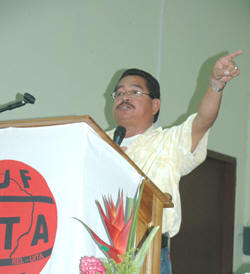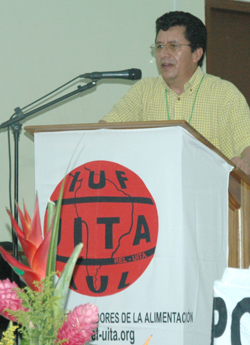|
Colombia -
Urabá
|
Forum in Defense of Employment
concludes with great success |
SINTRAINAGRO plans to form a common front in defense
of the Banana industry. The possibility of advancing
a regional civic strike is being considered
Colombia’s National Union of Agroindustry Workers (SINTRAINGRO)
proposed that a task force be established in the
region of Urabá, involving representatives
from the Government, corporate management,
distributors, workers, and every active stakeholder
in the region who has been in one way or another
affected by the crisis in the banana industry.
The proposal was presented by the organization
during the Forum in Defense of Employment and
Social Development, which was held at SENA
headquarters in Apartadó, Department of Antioquia.
Some 400 people participated in the event, but no
Government authorities or representatives of the
distributors were present, an absence which was
criticized by the panelists.
|

Guillermo Rivera |
Banana workers expressed their concern over
plantation closures and mass layoffs, which are
justified by management as caused by the peso’s
devaluation against the US dollar, but
SINTRAINAGRO attributes these events more to
the intermediation in the fruit’s
commercialization. There was also a clear
opposition manifested against the replacement of
banana crops with African Oil Palm.
Participants revealed that 2000 hands are
required to plant 1000 hectares of banana crops,
while only 100 jobs are necessary to cover the
same extension of African oil palm.
SINTRAINAGRO
President Guillermo Rivera said that the
establishment of a social task force in Urabá
was urgently needed to promote the area’s
development, and that such effort required a
true commitment from the Colombian government,
as well as from the distributing companies and
the three transnational corporations that have
monopolized this business.
“We want to devise a strategy that will enable
us to find solutions to the root causes of the
crisis in the banana industry and avoid a social
conflict that would lead to a regional civic
strike with serious consequences for everyone
involved,” the union leader maintained.
Gerardo Iglesias,
secretary of the Latin American regional office
of the International Union of Food,
Agricultural, Hotel, Restaurant, Catering,
Tobacco and Allied Workers’ Associations (Rel-UITA),
who participated in the Forum, expressed his
concern over the possible displacement of banana
crops by African oil palm crops. The cultivation
of African Oil Palm around the
world is characterized by precarious
labor, low wages, and dreadful working
conditions, in addition to multiple negative
environmental and health impacts.
Iglesias
declared that “SINTRAINAGRO has enough
influence to successfully call a social task
force involving every active stakeholder in the
region of Urabá, to work on seeking
solutions to the current crisis arising from the
peso’s reevaluation against the dollar, which
alarmingly threatens the jobs of many workers in
the Urabá and Magdalena banana
plantations. Workers are fortunate to have an
organization like SINTRAINAGRO that has
earned national and international respect.
|

Luis Alejandro Pedraza |
For his part, Roberto Hoyos, President of
AUGURA, said that nobody imagined the dollar
would climb as high as 1,900 pesos. Production costs
are increasing daily, with oil byproduct input
prices rising more and more. At the current exchange
rate, this business is not viable. He acknowledged
that they had received more than one billion pesos
from the Government, which “is a significant
contribution, but in the last three years the sector
has lost 1.28 trillion pesos in earnings. Producers
are in a very delicate financial situation. He
suggested that the tripartite committee be
reactivated to deal with the situation.
Luis Alejandro Pedraza,
president of the National Agro-Food Union of
Colombia (UNAC), said he was in favor of
forming a common front in the banana regions in
order to defend this agroindustry. He also opposed
the possible replacement of banana crops with
African Oil Palm. “Two thousand jobs are generated
for every 1000 hectares of banana crops and only 100
jobs are created for every 1000 hectares of oil
palm, which means that there is an obvious
difference in this sense, with huge employment and
social implications for the region. He underlined
the importance of holding forums like the one in
Urabá, as they provide an opportunity for
assessing the situation of the industry, analyzing
its prospects, and putting forward solutions to the
crisis caused by the peso’s devaluation.
Fanny Wilches,
territorial director of the special work office in
Urabá, pointed out that the Government was
closely following the devaluation process of the
peso against the dollar, and the implications it may
entail for exporters. It’s no secret for anybody,
she added, that this situation will have a huge
impact on job generation. In this case, every social
stakeholder has the responsibility of presenting
alternatives to overcome the crisis.
Teodoro Díaz Lobo,
president of Convergencia Ciudadana, Urabá,
admitted that there are alarming problems, and that
the crisis does not affect small and large producers
alike. He pointed to the importance of seriously
analyzing the situation with the aim of devising
alternatives, securing the involvement of the
Government, and developing policies for agroindustry.
Luis Guillermo
Sánchez
SINTRAINAGRO Agency
June 6, 2007

Volver
a Portada
|
UITA - Secretaría Regional
Latinoamericana - Montevideo - Uruguay
Wilson
Ferreira Aldunate 1229 / 201 - Tel. (598 2) 900 7473 - 902 1048 -
Fax 903 0905
|